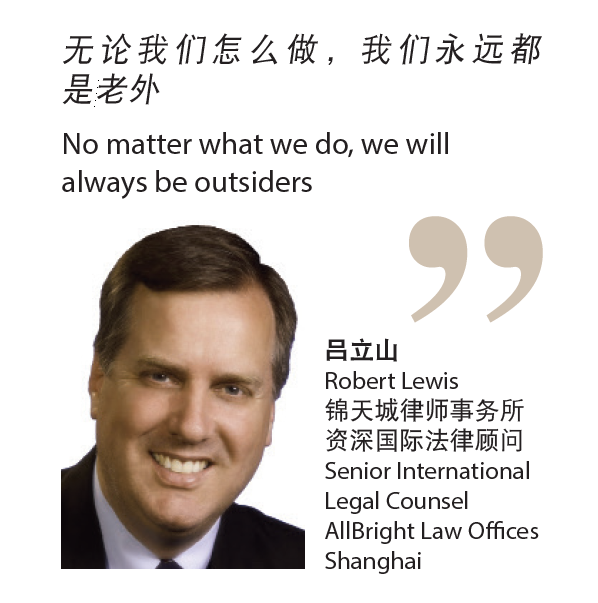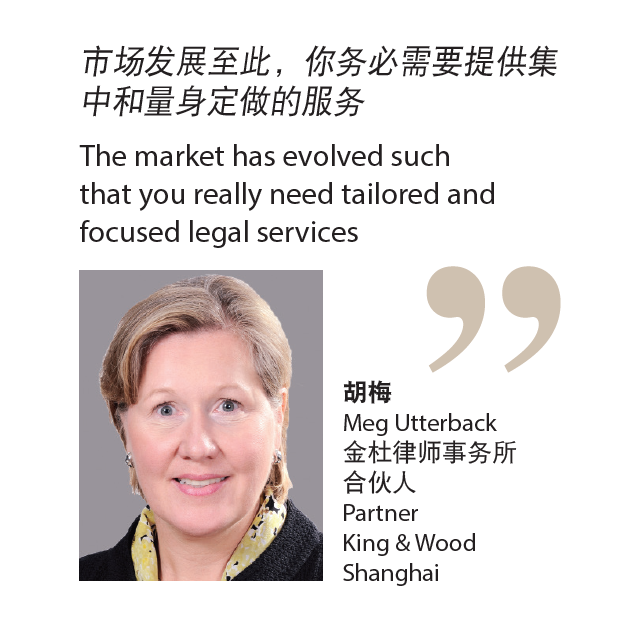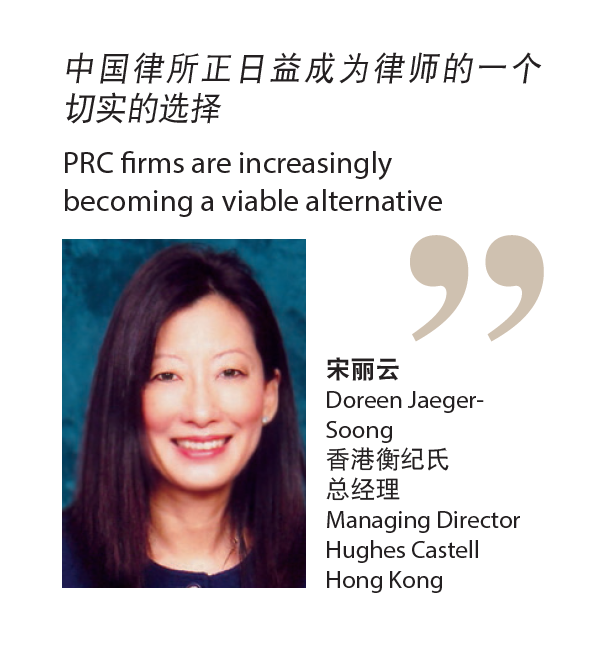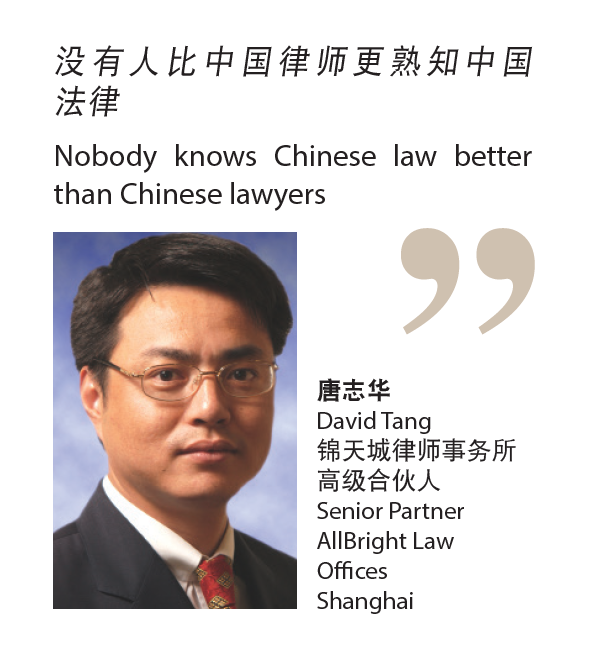This year has seen a succession of high-profile lawyers move from international law firms to PRC firms. But why have they moved, and what have they found? And what does having PRC and international lawyers under one roof in a local law firm mean for clients? By Alice Gartland
“Going forward, there are going to be more opportunities open to local law firms than there will be for the foreign firms,” says Robert Lewis. In May, Lewis acted on his conviction. He left Lovells (just as it was merging to become Hogan Lovells), where he was Beijing managing partner. He moved to become senior international legal counsel at AllBright Law Offices, a top-tier PRC firm with its roots in Shanghai.
Lewis is not alone. More recently, Meg Utterback, the former Shanghai managing partner of US law firm Pillsbury Winthrop Shaw Pittman, left to become a partner in King & Wood’s international arbitration practice.
The moves by Lewis and Utterback might easily be viewed as isolated instances of “old China hands” going native, or even winding down before they retire. But scratch the surface, and it is clear that such moves are part of a wider process of internationalization at PRC firms. AllBright has recently welcomed a number of lawyers with strong backgrounds in international practice, including David Tang, a former counsel at Pillsbury; Richard Lee, a former consultant at Simmons & Simmons; Louis Meng, a former Partner at K&L Gates in Shanghai; and Ghislain de Mareuil, previously a Shanghai-based partner at DLA Piper.

Other developments at King & Wood include its merger with Arculli Fong and Ng in Hong Kong in July 2009, and the transfer of the team from SG Fafalen, also in Hong Kong, to the firm in March. And in May Rupert Li, previously chief representative of Clifford Chance’s Beijing office, was appointed King and Wood’s international managing partner.
At Zhong Lun Law Firm, Jane Yao recently joined the newly established Hong Kong office as a partner, having previously been a senior associate at Harney Westwood & Riegels. Yao is qualified to practise in both China and the United States.
Changing roles
Clearly, lawyers from international firms are beginning to see PRC firms as a place where they can pursue their individual career ambitions, and perhaps apply their entrepreneurial abilities most effectively.
That international lawyers would even consider working for a PRC firm is testament to how far local firms have travelled, and how fast. Utterback recalls that when she came to China in 1985 to study law at People’s University (since rebranded Renmin University in English), private Chinese law firms didn’t exist. ”The concept [of working for a PRC firm] never crossed my mind,” she says. Contrast this with today, when she says the move to King & Wood has been “the logical next step” for her career.
The changes in the legal market that have made local firms a real career option have accelerated in the current economic climate. Foreign direct investment (FDI) work for international clients – joint ventures, wholly foreign-owned enterprises and even some mergers and acquisitions work – has largely moved from international to domestic firms. Local firms are not only fully qualified to give legal advice, but – in these cost-sensitive times – charge less to do the job.
In theory, at least, lower fees need not mean lower quality. Utterback describes how many of her fellow Partners at King & Wood are fluent in English, have studied abroad and have been working with multinational companies for 10 to 20 years. “Often they have more deal experience in China than a lot of their international law firm counterparts,” she says.
Comfort, and cost control
As in inbound FDI, local firms have also established a strong position in domestic work for subsidiaries of multinational companies in China.
Utterback observes that as these companies have begun to elevate PRC nationals to senior management positions, it has become natural for them to communicate and work easily with PRC firms. Where local firms are able to match their PRC expertise with having foreign lawyers on their teams, this will provide a level of comfort back at the client’s overseas headquarters.

One hurdle that foreign firms in particular are facing is the price sensitivity of Chinese clients. Lewis observes that “usually for outbound deals over US$1 billion, the presumption is that the Chinese client will use experienced outside counsel and that will be most likely a major foreign international firm”. However, he adds that for smaller deals, “the value proposition doesn’t always exist in the minds of Chinese clients, and they may prefer just to use a Chinese law firm and a law firm in the target jurisdiction”.
Focusing on the target jurisdiction highlights another issue. While international firms may be international, their reach may not extend to places that interest Chinese investors. “The jurisdictions around the world that are targets for Chinese trade and investment don’t match up with where most international firms have their presence,” Lewis points out. Understandably, Chinese companies may look for firms with a real physical presence in the country in which they are investing. The point at which there is value in having a high-priced foreign law firm involved is not always clear.
International arbitration and dispute resolution is another reality that Chinese companies are having to face as a result of their outbound activity, and an area in which Chinese law firms are active. There is an increasing focus on dispute resolution in the US. AllBright is among the PRC firms developing a US litigation practice, and James Zhu and Steven Cui at Jun He Law Offices also see opportunities in this area (see Specialization in Silicon Valley on page 28).
As Lewis explains, the US buys about one-third of all the PRC’s exports, and accounts for one third of all China’s uncollected receivables. And when you sell products to the US, litigation will follow.
This illustrates another change in the legal market. China’s increasingly complex trade and investment patterns demand specialist expertise, in market sectors such as natural resources and in areas of practice such as intellectual property and competition. The days when an international lawyer could come to China and succeed as a generalist are, according to many, over. As Utterback explains, “the market has evolved such that you really need tailored and focused legal services, and it’s hard to do that in a generalist firm of 10, 20 or even 30 lawyers”. At King & Wood, she says, the ability to draw upon the knowledge of large specialist departments “has a huge advantage over being a generalist”.
Client relationships and corporate culture
Market developments aside, what becomes of client relationships when a foreign-qualified lawyer makes the move to a PRC firm? A number of lawyers who spoke to China Business Law Journal said that their clients had followed them to their PRC new firm, and had seen the move in a positive light. Other lawyers pointed to their non-compete agreements, but said they were developing new client relationships in similar sectors, while gaining greater access to new PRC clients.
But what really happens when an international lawyer arrives at a local firm on the first day at work? “Nobody who makes this move can ever anticipate that the infrastructure is going to be the same as at an international law firm, and you have to take the challenging aspects of the platform along with its competitive advantages,” says Lewis.
The traditional structure of PRC law firms has emphasized individual business generation, where the personal relationships of individual lawyers would win work, rather than winning through expertise, the collective or brand value. However, Lewis says “this is changing and we are in the midst of that change”, and there is an increasing emphasis on the importance of teams and brand value. The knowledge transfer that occurs when senior lawyers move to PRC firms may turn out to be a key part of that process.
Logically, there would seem to be common interest between new international arrivals and the lawyers at the PRC firms that attracted them, to work together. As Lewis says, “I think it is healthy for long-term expatriates and others to recognize that no matter what we do, we will always be outsiders.” However, he has found that “there are alignments and shared objectives and natural points of gravitation where you find like-minded people to work with”.
On a daily basis, it may be teamwork that underpins the competitive advantage of having overseas-qualified and PRC lawyers providing a combined service at a local firm, rather than requiring a client to engage foreign and PRC counsel separately. When rendering a legal opinion, Utterback describes how she can now walk down the corridor to talk directly to the person about who is drafting it: “This is very different from a foreign firm trying to tell a lawyer at a PRC firm what they think he or she should be rendering, because that will not be the guy they went to lunch with that day.”
The battle for talent
Recruitment consultants believe that the flow of overseas-qualified lawyers with strong backgrounds in international practice is likely only to grow.
International China work requires teams with the right mix of skills. These include English and Chinese language capability; PRC and foreign jurisdiction expertise and qualifications; sector-specific expertise and cross-cultural awareness. Very few, if any, lawyers are going to offer the whole package.
And while there are obvious benefits to having both PRC and overseas-qualified lawyers in leadership positions, consultants say internationalization also needs to occur at the junior and middle levels in order to build a culture and capability that supports Chinese firms’ international ambitions in the long term.
This seems already to have begun. James Rowland is an Australian lawyer who is counsel in King & Wood’s international litigation and arbitration practice. He previously worked in an in-house role. Angie Ng, an Australian lawyer and senior associate in King & Wood’s competition practice, joined the firm following a secondment from Australian firm Gilbert and Tobin, with which King & Wood have had a longstanding association. Ng believes the combined foreign and PRC capability that King & Wood offers means that there is no longer the “broken telephone” that can occur when international and PRC counsel are engaged separately. Her move also demonstrates the growing need for specialist lawyers, particularly in specialist areas such as competition, which Ng describes as the “new black” in legal practice in Asia.
Some PRC firms, including Fangda Partners, have sponsored PRC lawyers to qualify in the US. Others, including Jun He, are involved in summer internship programmes for American law school students. Denvy Lo, a recruitment consultant at Laurence Simons in Hong Kong, has noticed a growing desire among foreign qualified lawyers at all levels to move to Hong Kong and mainland China.
Sometimes for an individual lawyer, the move requires an entrepreneurial approach. Adam Silverman, previously a junior associate with the dispute resolution team at English firm Wragge & Co, says he was inspired by the Chinese lawyers participating in the Lord Chancellor’s Scheme for Young Chinese Lawyers in the UK.
Following a period studying Putonghua in Beijing, he has undertaken an internship with the China International Economic and Trade Arbitration Commission and will shortly be starting an internship at Zhong Lun. Silverman recognizes that the best place to develop the skills to advise a foreign or Chinese party in any China-related dispute is China.
For PRC lawyers who are also qualified overseas, there are many reasons why a move from an international to a PRC firm might seem attractive. According to Doreen Jaeger-Soong, managing director of recruitment firm Hughes Castell in Hong Kong, in a local firm such lawyers will be able to issue and sign off on PRC legal opinions, practise a wider range of law, gain access to a wider range of clients who have switched over to PRC firms and, if they join as a partner, potentially lower their income tax liability.
“Foreign firms provide excellent legal skills training and international exposure,” says Jaeger-Soong. “However given the advantages mentioned, combined with cost and quality-sensitive clients, PRC firms are increasingly becoming a viable alternative.”

How long will PRC firms maintain the cost advantage they currently have over their international competitors? As Lewis, formerly of Lovells and now of AllBright Law Offices, points out, fee-earner compensation comprises the biggest part of any law firm’s fees. “The only way that lower prices can work effectively is if you have a lower cost base,” he says.
According to Jaeger-Soong, salaries have increased rapidly at top PRC firms, especially in the junior and mid level for dual-qualified candidates. Salaries at international firms for dual-qualified international-track lawyers remain much higher. “At partner level, due to the entrepreneurial structure of most PRC firms, partners can earn far more than at an international firm,” she adds.
Specialization in Silicon Valley
IP specialist James Zhu recently moved from being managing partner of the Beijing office of US law firm Perkins Coie to Jun He Law Offices. Together with Zoe Wang in Shanghai, he is leading the development of the firm’s intellectual property practice. Wang also moved from Perkins Coie, having previously been managing partner of its Shanghai office.
The two of them have been joined by another new IP partner, Steven Cui, who moved to Jun He from Jones Day to develop Jun He’s new Silicon Valley office.
Zhu and Cui both have experience of developing offices in China for US firms. But, as Zhu describes, he saw a “switch in paradigm”. Instead of helping a US law firm to set up in China, he could help a Chinese law firm set up in the US.
The restrictions placed on international firms in China with regards to practising Chinese law, combined with growing quality of PRC firms and their competitive price positioning, meant that Zhu and Cui both saw greater freedom to develop an IP practice from the platform of a PRC law firm.
In addition, they recognized a demand from clients for a closer relationship between PRC and international counsel. Zhu and Cui saw the Silicon Valley plan as an opportunity to build a team that could act as a “conduit” to assist Chinese companies involved in the US, as well as US companies involved in China.
Zhu takes care to point out that Jun He’s Silicon Valley office is not in competition with US firms, but operates in a different market segment and can work with them.
Enthusiasm
There was a genuine sense of enthusiasm and energy among all the lawyers that spoke to China Business Law Journal in the course of the research for this article. They clearly relish the opportunity to develop their practices and contribute to the development of their new firms.
As David Tang, a PRC-qualified lawyer who moved in June from Pillsbury where he was counsel, to AllBright where he is senior partner, points out, “nobody knows Chinese law better than Chinese lawyers”.






















